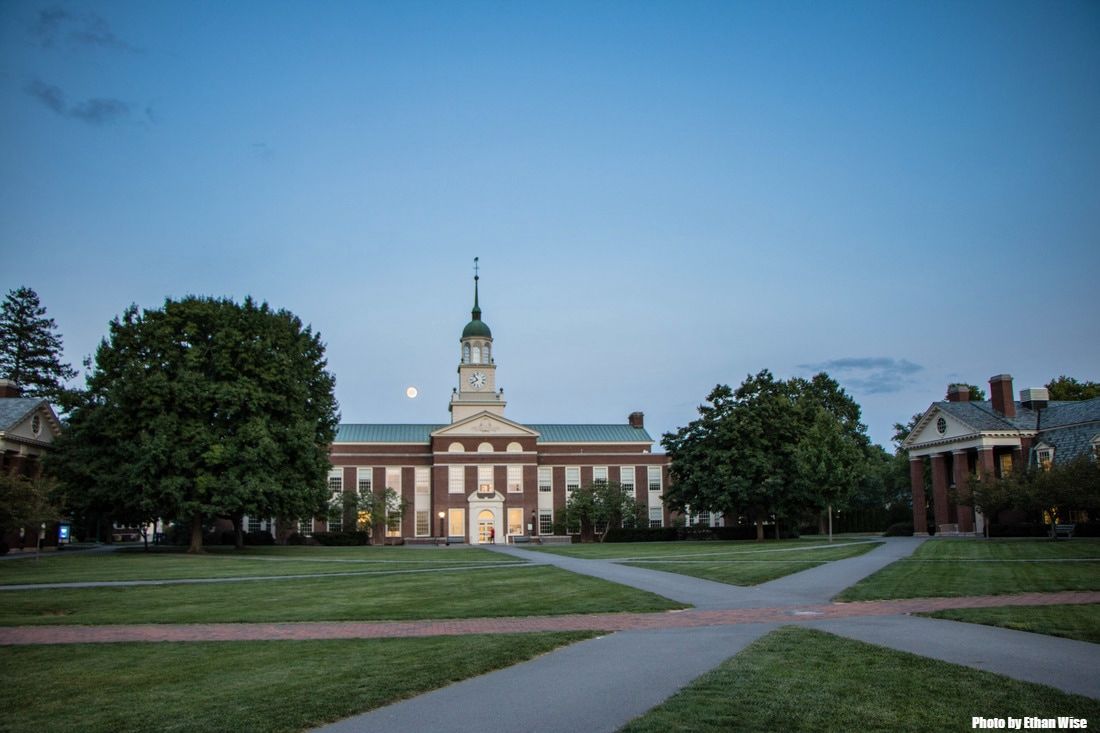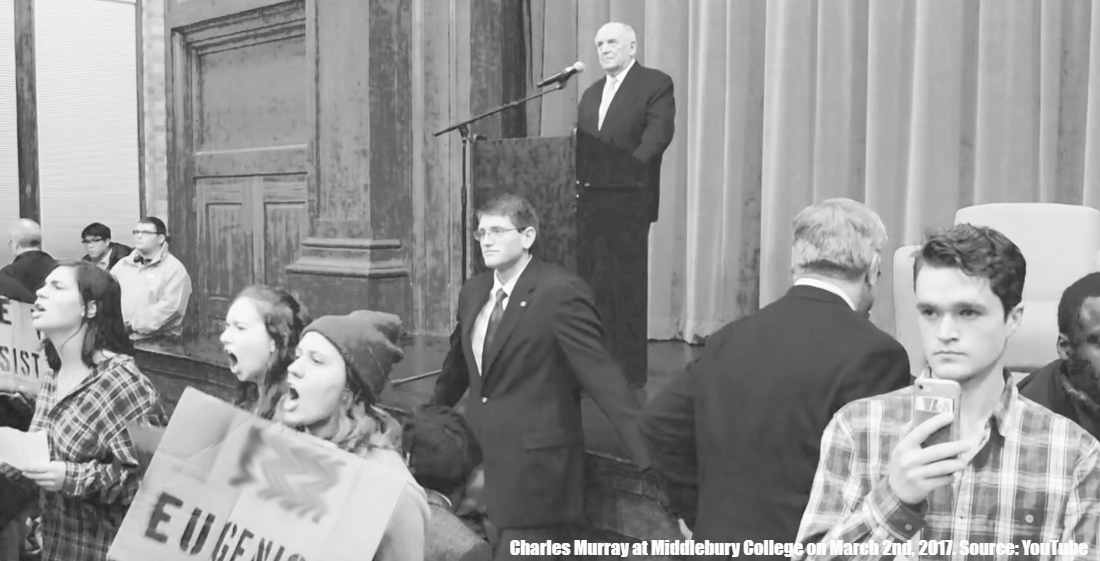Memory EternalAlf Siewers | [email protected] According to European scholars in The Black Book of Communism, 80 to 100 million people were killed by communist regimes in the last century, ranging from victims of labor camps to those of “food terror” famines.
This year marks the notorious centennial of the Russian Revolution, which gave birth to this phenomenon. The Black Book notes that the deadly global phenomenon of Communism had a direct genealogy from ideology and practices that grew out of the October 1917 Bolshevik Revolution, and also helped inspire Nazi death camps and methods. On our secular and leftward-tilting campus there are no solemn remembrances or critical examinations of this communist phenomenon scheduled currently. On the contrary, occasionally there are displays of Red Army and communist images by faculty with apparent approbation, as one faculty member quoted Lenin seemingly approvingly in a discussion, all without remark. Nazis ideas and insignias understandably are taboo, given the horrible record of the Nazi regime, to the extent that even a quarter-sized swastika drawn on a bathroom stall prompts campus-wide soul-searching (as should be the case), and periodically campus hosts remembrances and critical examinations of the Holocaust (as should be the case). But why the silence in the case of communism? While understandably there is criticism in US history of McCrthyism, sometimes an hysterical and needlessly damaging search in Cold War America for Communist enemies within our society, and a demonizing of people so labeled, today some of the same spirit arguably infuses the loose categorizing by the Left of people as fascists or by other labels. Yet totalitarian movements are dangerous in the willingness of individuals to devote themselves to ideology as a kind of new religion without God, in which paradoxically the ultimate autonomy of the individual leads to servitude to an ideological cause without moral restraint. The release of information from Soviet and US intelligence archives in recent years has revealed that there indeed was a widespread Communist spy network in the US, knowledge of which was kept from the public by US intelligence agencies. Its extensive nature ironically largely was missed in McCarthyite politics. And if someone was known to have been a Nazi ally, would that justify blackballing or expecting public repentance, given the atrocities of that system’s deadly acts? If so, why not for a Communist after some of the atrocities of that system had become known? The philosopher and Jewish exile from Nazism Hannah Arendt noted in her classic The Origins of Totalitarianism that totalitarian movements and regimes on both the Left (Communism) and Right (Nazism) had a common core: Terror identified with isolation. Both involved the categorization of people and quotas for their persecution, often immersing them culturally according to Arendt in a social identity fostering the mentality of being able to embrace being both persecutor and thought/identity criminal simultaneously. In the case of Nazism it was racial genocide, in the case of Communism class and cultural genocide. Our blindspots often tell as much or more about ourselves as our ideals. My children are the first in a few generations in their family line able to be publicly baptized and express their faith identity. Millions of my faith community were killed or tortured or silenced under Communism, as many are today in the Middle East by radical extremists acting falsely under the banner of Islam. The memory of the Communist persecutions is a trauma still within the warp and weft of our tradition, and those slain dwell within our transgenerational and living memory continually in our services and homes, and in what we call the “joyful sorrow” of the martyr saints who form a part of our extended family. Defending both free expression and opposing the hateful categorization of people for quota-style persecution, from the Right or Left, is the best way to remember the tragic centennial of the Russian Revolution. This is indicated strangely by two of the most critically acclaimed films of the Western genre that typified American myth-making in the twentieth century: High Noon and Rio Bravo. High Noon was made according to its script writer, a former Communist who was later blacklisted, as an allegory critiquing McCarthyism, although its director, a Jewish refugee from Nazism, saw it as an allegory for the dangers of appeasing Hitler. Rio Bravo was made as a response to High Noon, to emphasize how average Americans could stand up against Communism. The common denominator: Bravery and decency in the face of bullying by power-hungry and violent organized crime, which in their allegories rightly equate with totalitarian systems. Today, both films remain classics, even as their precise political contexts have faded in the minds of twenty-first-century audiences for classic 1950s Western films. What remains in them is a lesson of virtue from the battle against totalitarianism on both the Left and the Right in the last century: The importance of moral courage, free expression, resistance to objectifying one’s self or others in the name of ideology, and an active love for community and other human beings—all in the struggle to be an authentic person. They remind us of the biblical dictum for love of country and community and human beings versus totalitarianism: “Greater love hath no man than this, to give up his life for his friends.” Not to give up life for ideology, Big Brother, or the deep state. To such virtue-lessons I would add discernment of the dangers in our secular age of replacing God with worship of an idea or ideology, turning toward power. The historically unprecedented mass killings of the twentieth century were committed in the name of humanity, not God. The Russians have a saying in their church funerals: “Memory eternal.” It forms the end of Dostoevsky’s classic book The Brothers Karamazov. Its purposeful ambiguity means both a call to keep those departed in memory and a prayer for God to remember them—really an affirmation that we are all related to each other in the larger mystery God’s memory, beyond whatever any categories and objectifications that mortal ideologies might impose
0 Comments
What Does B.A.D. Really Stand For?Madison Cooney | [email protected] The election of President Trump into office has seen many things for the country, but also for Bucknell. One of the biggest things that Bucknell’s campus has seen is the rise of a new group called B.A.D., or Bucknell Alternative Delegation. I affectionately call this group Babies Against Donald, which fits their acronym and their purpose on campus. Since the founding of B.A.D., Bucknell has seen an absurd amount of unnecessary protests and many students have learned just how entitled our peers feel.
Bucknell was first introduced to B.A.D. through an open letter that was sent out to all of the student body that was full of demands. While the letter provided some things that may have been legitimate talking points, I lost respect for those who wrote it from the very beginning. The fact that the students felt so entitled that they could demand things from the President and the University was astonishing to me. I have never seen such a sense of entitlement. Who are they to demand things? Request things, sure, but to demand something requires power and that is the kind of power that students do not and should not have. If these students have such a problem with the way the University is being run that they feel as though they can - and need to - demand things, they should really consider going to school that has already implemented their demands. No one is making them stay. This letter started off by demanding “Bucknell become a sanctuary for all marginalized community members who have chosen to pursue their education here.” Almost anyone should be able to pursue an education at Bucknell, not just the marginalized community members. The key phrase in that demand is “chosen to pursue,” meaning that the students they are demanding sanctuary for chose to go here full well knowing what the university was like. The demands have subsections and one subsection that I found appalling was the section that stated the Bucknell should provide financial support for the undocumented students because they cannot receive federal funding. It amazes me that this is not common sense to students on our campus. There are intelligent people on this campus who think that Bucknell should be providing support because undocumented students are unfairly kept from federal funding. Of course undocumented students are kept from federal funding because they are not in accordance with the laws of the federal government. Why should Bucknell support someone’s illegal activity? There are many other problematic subsections under the first demand, such as the demand for “the right to live, party, and mingle in a space distinct from university housing restrictions and limits of conduct.” The only spaces that are distinct from university conduct violations are the downtown houses. I know conduct violations take place in Fraternity houses on a regular basis, but Bucknell does not willingly let that happen. If misconduct happens and the University is made aware of it, they address it. The only place to be mostly free from University conduct policies is in downtown housing and even then, some University conduct rules still apply So why would Bucknell give something to this organization that they do not give to everyone else? The second demand states, “the university become a sanctuary for open dialogue of political discussion and practice regardless of ideology, barring hate-speech, personal attack, and/or threat to the safety of individuals and groups.” While this would be great, it is almost completely unattainable, mostly because of the members of B.A.D. or other students who signed the letter. It is not the Conservatives on campus who have problems engaging in dialogue , it tends to be the regressive liberals, as I know from personal experience and more than one death threat from people of that political persuasion on campus. This demand is also problematic because the use of the phrase hate-speech which has a loose definition that has never been clearly defined. When it is defined, almost anything said on campus should be hate-speech so should we just stop engaging in dialogue because heaven forbid we offend someone. If B.A.D. has a problem with campus political discussion, they should address it within their own community, not as a campus-wide discussion. The Bucknell Alternative Delegation has since that letter caused many disruptions on campus for seemingly no other purpose than to disrupt campus business. They have held two student walkouts and a day of protest, but the only thing I see happening throughout those events is those students losing out on class time and the significant amount of money they pay to be in class. While peaceful and nonviolent protest is absolutely their right, I simply do not understand what change they think they are causing on Bucknell’s campus by doing so. It is not as though the national news is going to notice the protests that are happening and applaud some Bucknell students for it. It is my firm belief that one of the most problematic element of the campus activities initiated by B.A.D. is the open support they have from faculty. I think it is great that Professors want to support their students and should freely speak their opinions on political matters, but not to the detriment of other students in their classes. There have been many instances where Professors have canceled class and all but forced their classes to participate in the protests through their actions of following their classes outside. If B.A.D.’s entire purpose is for everyone to have the freedom to speak, then Bucknell students who do not support them should not be forced by Professors to attend these protests and students who do not support these actions should not be academically harmed because their Professor decided to not have class. I completely support a freedom of expression in almost whatever form you choose but I wish that the Bucknell Alternative Delegation would wake up and see they appear as entitled babies to those who do not agree with them. An Open Letter to Professor Aaron HanlonAlex Suss | [email protected] Dear Professor Hanlon,
I read your article, “Advice for My Conservative Students” (The New York Times, February 16, 2017) with interest and anticipation caused by my belief that taking advice from people who know more and have greater life experiences is a wise course of action. I will start with full disclosure; I must admit that I do consider myself “conservative.” First, to follow Socrates, I know how little I really know to assert my philosophical or political credo with a substantial level of certainty. Second, because the other option, “progressive” was not intellectually attractive to me. Walter Lippmann, described it best, “The collectivists […] have the zest for progress, the sympathy for the poor, the burning sense of wrong, the impulse for great deeds […]. But their science founded on a profound misunderstanding […] and their actions, therefore, are deeply destructive and reactionary.” His words resonate with me deeply. In the ancient and ongoing struggle between Emotions and Reason, I am firmly on the side of Cogito. To start I must acknowledge that, at Bucknell, where I have taken classes lead by professors from both sides of the political or cultural spectrum, I have not experienced anything but fairness and support as you mentioned in the closing lines of your article. My second comment concerns your passage, “What I am getting at is that I was never a victim.” I agree with you, I don’t feel that I am a victim. There are much bigger and greater issues at stake where the “victimology industry,” the brainchild of the “progressives,” causes immeasurable damage. Victimization is present in our culture in great many manifestations. It is a tool widely and skillfully used to divide and conquer. Regrettably its emotional power resonates with many. You assert, “You know the world doesn’t love a victim.” I would love to believe that, yet every day I read the papers, books or hear on television a monotone monologue about victims. Concepts like social justice, access to healthcare or education, and immigration are fully loaded with – yes, victims. We have past victims, present victims, victims in the making, and of course future victims. If that is not the case in Maine, I am transferring to Colby! Furthermore, I agree with your observation that “conservative leaders and icons have largely abandoned traditional conservatism.” So did vast segments of our culture, and most importantly academia. The shift is seismic – you can get a degree in literature from some of the most prestigious universities and never read a word of Shakespeare. For every book written by a conservative there are ten published by authors with opposing views. For every academic with conservative views there are eight who do not. Sowell wrote about it better than most. Lastly, I wish you would have written advice to a different audience, and I urge you do so. Advice to progressive students is needed more than ever. It is their desire to shut down ideas and words that are “hurtful.” It is their need for “trigger warnings” and “safe harbors” that is antithetical to the very definition of a university student and college should be. How do you discuss Sowell or Noonan if trigger warnings go off? Should conservative students insist on their own warnings when we read Marx, Sartre, or Foucault? Where does negating open dialogue and arresting and stifling free exchange of ideas lead? This is clear and present danger. Those who promote and produce climate of intellectual intolerance would benefit from your advice greatly. Best regards, Alex Suss Bucknell University FIGHT WITH WORDS, NOT FISTSG. Orwell | [email protected] On February 1, 2017, a UC Berkeley event featuring notorious media personality and provocateur Milo Yiannopoulos was shut down by masked, “anti-fascist” thugs. This flagrant display of ideological intolerance and intellectual infantilism was the latest in a string of incidents in which protesters have shut down speeches, damaged property, assaulted conservatives, blocked traffic, and committed a litany of other offenses. These individuals, emboldened by the Left’s deplorable approval of such criminality, are gradually blurring the line between a legal protest and an illegal riot. What is equally problematic is the Left’s proclivity to justify the violation of the speech and property rights of others, under the banner of social justice.
Leftists, on the whole, believe in the existence of systemic iniquities, mystical forces like “white privilege” and “the patriarchy,” designed to oppress minority groups for the benefit of straight, rich, white, Christian, able-bodied, cisgender males. Basing your policies and proposals on this core premise necessitates that politics be viewed through the lens of victimhood. Consequently, when you indulge a generation of minorities with the idea that they are perpetual victims of bigotry, they are trained to feel as if any action, no matter how illegal or immoral, is justified, so long as it is committed in response to racists, sexists, homophobes, xenophobes, transphobes, Islamophobes, ableists, or any -ist or -phobe in the book. This philosophy illustrates perfectly why professors like Marcellus Andrews believe it to be professional and acceptable to libel conservative students, and make nuanced threats against them. This mentality also explains why feminist students seem to think they are entitled to rudely and audaciously interrupt Christina Hoff Sommers, for committing the cardinal sin of presenting a viewpoint with which they disagree. Last year, there were numerous instances of vandalism, in which posters advertising an event featuring Milo Yiannopoulos were torn down or stolen. These individuals recognize that under a left-leaning administration, in a vastly and incontrovertibly left-leaning institution, their odds of facing disciplinary action for offenses perpetrated in the name of “social justice” are slim to none. While these are just a few examples of inappropriate conduct toward conservative students and speakers at Bucknell, they pale in comparison to the utter felonies that are committed – and justified – elsewhere. America noticed a resurgence of violent protests in the wake of a number of police killings in late 2014. The Black Lives Matter movement has instigated innumerable protests, marches, and riots, many of which have devolved into outright chaos, resulting in empty stores and tens of thousands of dollars in property damage. BLM leader DeRay McKesson has since begun teaching a course at Yale University, entitled “In Defense of Looting,” in which he describes looting as “a righteous tactic.” It’s no secret that American universities are hotbeds of Leftism. But the fact that such a prestigious university has introduced looting and rioting into the realm of defensible forms of a First Amendment right underscores the extent to which the Left is prepared to justify felonies in response to perceived injustices. This brings us to the incident at Berkeley, which illuminates the dichotomy between the Left’s views on free speech in the 1960s and those of today. Berkeley, once known as the birthplace of the Free Speech Movement, has decayed into a Leftist breeding ground of speech codes and ideological bigotry. Leftists persisted in their display of intolerance of opposing viewpoints, as Yiannopoulos’ event was quickly and violently shut down, such that Yiannopoulos had to be evacuated from the building by his cohort of security guards. Even more troubling, a few days later a collection of editorials appeared on the website of The Daily Californian, Berkeley’s student newspaper. The titles of some of these pieces included “Condemning Protesters Same as Condoning Hate Speech,” “Violence Helped Ensure Safety of Students,” and “Check your Privilege when Speaking of Protests.” The existence of a contingent of Americans willing to advocate for physical violence in response to a mere speech, and to equate feelings of offense with bodily injury is, if not unsurprising, particularly disconcerting. The Left is increasingly adopting this philosophy, as exemplified by the debate over the battery of Richard Spencer, in which reputable media outlets like The New York Times legitimately entertained the notion that you can punch a Nazi for what he says or believes. This is how free speech dies. Fortunately, we haven’t yet reached that point, but the idea of violence as a reaction to speech is insidiously gaining traction among the Left. In one of The Daily Californian editorials, Nisa Dang asserted, “As I recently wrote in a tirade against this brand of idiocy, asking people to maintain peaceful dialogue with those who legitimately do not think their lives matter is a violent act.” The fundamental claim behind such absurdity is that physical retaliation against verbal expression is justifiable based on the content therein. That is to say, it is permissible to brutalize anyone with whom you disagree, so long as you claim that you were offended by their words. This would officially mark the death of free speech in America, and alarmingly, it’s not as preposterous as it once would have seemed. All of the nonsense and lawlessness connects back to the idea of social justice. The impetus behind such a tremendous spike in violent protests and riots is the Left’s continuous assurance that, because minorities are oppressed by evil white men, they are justified in retaliating against perceived instances of bigotry. When you combine that notion with the culture of victimization, with microaggressions, trigger warnings, and safe spaces, which encourage individuals to seek out evidence of bigotry in innocuous words and actions, this phenomenon perpetuates, and it manifests in ways that affect all of us. There was no justification for Professor Andrews’ cowardly libel of conservative students. Had he actually attended the speech, he would have found that Yiannopoulos, whom the “racists and fascists” invited, acknowledged the historical discrimination of African-Americans, and argued that “they are still owed something.” Similarly, the conduct of a number of students, and a professor, during Christina Hoff Sommers’ lecture was downright rude and indefensible, and I highly doubt that similar behavior would have been condoned during Anderson Cooper’s event. All of this can be resolved by restoring basic standards of decency and civility, and actually disciplining those who act improperly, irrespective of race, gender, or religion. As Voltaire so eloquently said, “I disapprove of what you say, but I will defend to the death your right to say it.” If you oppose somebody’s ideas or find them offensive, rather than attempting to quash his right to speak, or relying upon physical intimidation, criticize and refute the arguments themselves in an honest debate. Free speech is one of your most fundamental and inalienable human rights. Use it. THE CALL TO DEBATEJosh Hunter | [email protected] “I may be wrong and you may be right and, by an effort, we may get nearer to the truth.”
~Karl Popper Since the election of Donald Trump there has been an uproar on colleges and universities nationwide. There have been numerous walk-outs, teach ins, strikes and safe spaces. All done with the purpose of giving a middle finger to the current administration. These actions are the height of group thought and as Nietzsche and Kierkegaard would describe “the herd mentality.” However, It should be known that they all share common shortcoming. They all fail to provide the thing that given our current state of partisan politics is needed most, genuine debate. The current antics of those on the left are how ESPN analyst Will Cain describes “those who have never had to win an argument in eight plus years.” Rather than using this election as wakeup call that there are many who do not accept the current liberal agenda, many on the left have viewed this election as a “whitelash” or further proof of systemic racism and white supremacy. And have amplified their old tactics. Whether it be making a new year’s resolutions video for white guys, or stopping prominent conservative speakers from lecturing on college campuses one thing becomes clear: the left is not ready to come to the debate table and make a legitimate case. As I attended the opening rally for the “Bucknell Day of Action,” on February, 17 one question came to mind. What is the point of all of this? Throughout the day I often heard the word “change” being used. But as I looked around the rally of people with very similar political views I had to stop and wonder, who were they hoping to change? Does the person with the microphone honesty believe that things have changed simply by preaching to the choir? The point of these rallies, walkouts, teach ins, and safe spaces are not to make a change, but, they are so that people can have their views validated. If these events were advertised as spaces to have dialogue with those who share similar thoughts, I would have no complaint. As a conservative who attends conservative lectures regularly, I must say I have no problem with this. Spending time with those with similar views can often be a worthwhile experience. However, I believe that none of these forms of action should be mistaken for any sort of platform of honest debate or discussion. Often times at these rallies the viewpoints that are brought up are talked about as if they should simply be accepted by everyone. You can make claims backed by no facts and receive applause and snaps from your peers around you, even if the statement made is a complete oxymoron. For example, during the day of action, the following statement was made, “there is a gender pay gap, men earn more than women.” There was no correction by the professor by the end of this statement. There was just a room full of smiles and nods. There was no statement of how we gender discriminate. Or who specifically gender discriminates. There was simply an acceptance of false presumption that continues to be disproven daily. Similar behavior was seen on February, 9th when Christina Hoff Sommers came to Bucknell. Ms. Sommers considers herself an equity feminist, however she does not believe in what she calls feminist “myths.” The point of her lecture was to provide insight into her beliefs on the origins of some of these myths, as well as debunk them. After Ms. Sommers had completed her lecture she opened up a question and answer session. During this event she was asked very pointed questions intent to prove that she must have a lack of compassion; for those who have personally experienced sexism in their lives. I recall only one student reciting any sort of facts to dispute the claims made by Ms. Sommers. Other than that most of the arguments contained statements such as “I know a person who…,” or “In my life…”. The basic argument turns out being “ I have seen/experienced something; therefore you rejecting that this happens on a large scale makes you ignorant or insensitive.” First off, this is ironic because this is an example of attacking the person and not the idea. It is a violation of the “safe space” many of these students claim they adhere to. Secondly, these statements suggest a lack of ability to debate on the points they wished to convey. If the gender pay gap is so real one person rejecting its existence should not result in shock. Instead, it should be easy to prove that person wrong. This lack of willingness to engage in honest debate is something that needs to change. If you believe in white privilege, prove it. Explain how a young white male living in a trailer park in rural Pennsylvania enjoys certain privileges over all blacks. If you believe in the gender pay gap prove it. Show graphically why something that was outlawed over forty years ago still occurs today. Those are just two of the many controversial topics that need to be discussed. However, often times these conversations are difficult to have in the first place because of the PC culture in college life. Which makes it so that you have to constantly worry about not marginalizing or offending anyone. By constantly policing the way in which the other person phrases his statements, we shift the purpose of the debate from the original topic to the morality or “wokeness” of the other person. This is why PC should be disregarded during open debates. While respect is needed during debates, moral policing is a bully/stall tactic that has no other purpose than to hurt the credibility of the other person. It would be far more effective to discredit the other person through use of factual evidence. Throughout human history, debate was needed to convince people of things we now consider common knowledge. Concepts like gravity and even notions that earth is not flat were not ideas that were easily accepted. It took evidence and debate to persuade people that these ideas were correct. No political idea or concept is so flawless that it should be accepted by everyone immediately. So I challenge all students who want to make a difference to engage those who disagree with you in debate. Don’t shout, slander or shame. Engage, convince and change. Truly Inclusive? What I have seen as a disabled, minority, immigrant conservative at Bucknell3/22/2017 Truly Inclusive? |
|




